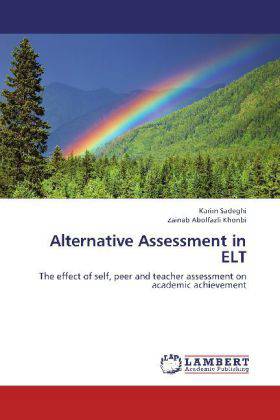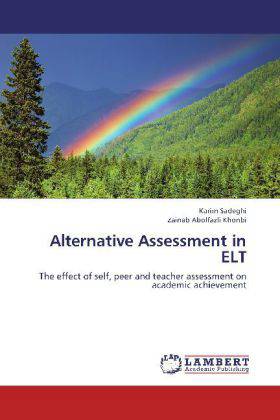
Je cadeautjes zeker op tijd in huis hebben voor de feestdagen? Kom langs in onze winkels en vind het perfecte geschenk!
- Afhalen na 1 uur in een winkel met voorraad
- Gratis thuislevering in België vanaf € 30
- Ruim aanbod met 7 miljoen producten
Je cadeautjes zeker op tijd in huis hebben voor de feestdagen? Kom langs in onze winkels en vind het perfecte geschenk!
- Afhalen na 1 uur in een winkel met voorraad
- Gratis thuislevering in België vanaf € 30
- Ruim aanbod met 7 miljoen producten
Zoeken
Alternative Assessment in ELT
The effect of self, peer and teacher assessment on academic achievement
Karim Sadeghi, Zainab Abolfazli Khonbi
Paperback | Engels
€ 67,45
+ 134 punten
Omschrijving
Testing and measurement can be claimed to be as old as humanity. People have always wanted to understand the value and attributes of stuff surrounding them and have therefore found tools to measure such qualities. As a science, however, educational measurement is a recent phenomenon. More recently the concern has been on how qualitative information can be elicited to reveal a more authentic picture of learners potentials that what psychometric tools reveal. Accordingly, there has been a shift of paradigm from quantitative-oriented testing and measurement tools to qualitative-focused assessment tasks. A further shift has also taken place to divert the initiation of assessment from teachers to learners themselves in the form of self and peer assessment activities as well as other alternative assessment procedures such as portfolios and journals. This research-oriented book evaluates the effectiveness of such alternative assessment on academic achievement in ELT and is hoped to be useful for both researchers and practitioners in education, applied linguistics and language testing.
Specificaties
Betrokkenen
- Auteur(s):
- Uitgeverij:
Inhoud
- Aantal bladzijden:
- 168
- Taal:
- Engels
Eigenschappen
- Productcode (EAN):
- 9783659275715
- Uitvoering:
- Paperback
- Afmetingen:
- 150 mm x 220 mm
- Gewicht:
- 241 g

Alleen bij Standaard Boekhandel
+ 134 punten op je klantenkaart van Standaard Boekhandel
Beoordelingen
We publiceren alleen reviews die voldoen aan de voorwaarden voor reviews. Bekijk onze voorwaarden voor reviews.









